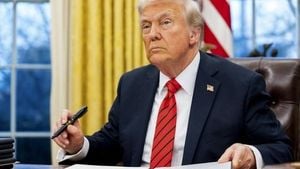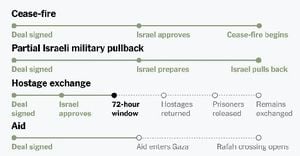In a dramatic turn of events that has sent ripples through diplomatic and energy circles, Venezuelan President Nicolás Maduro’s government spent months quietly negotiating with the Trump administration, offering sweeping concessions in a bid to end years of confrontation with the United States. According to reporting from The New York Times and Oilprice.com, the Maduro regime proposed opening up Venezuela’s vast oil and gold reserves to American companies, reversing years of resource nationalism and seeking to redirect the country’s lucrative exports from China to the U.S. The effort, however, ultimately failed when the Trump administration rebuffed the overture, cutting off diplomacy and escalating military pressure in the Caribbean.
The details of these secret discussions, which spanned several months leading up to October 2025, were revealed by multiple sources close to the talks. As The New York Times reports, Venezuelan officials, seeking to end their country’s clash with the United States, offered the Trump administration a dominant stake in Venezuela’s oil and mineral wealth. The proposal included opening all existing and future oil and gold projects to American companies, granting preferential contracts to U.S. firms, and slashing energy and mining deals with Chinese, Iranian, and Russian companies.
In an attempt to sweeten the deal, Maduro’s administration also offered to redirect Venezuela’s oil exports from China to the United States, a move that would have marked a significant shift in the country’s international alliances. “You have to hit commercial targets for U.S. companies. We don't think those targets are hard to meet. They are reasonable,” Trinidad’s attorney general John Jeremie said at a press conference, as quoted by Reuters and cited by Oilprice.com.
Despite these far-reaching economic concessions, the Trump administration, following direct instructions from President Trump, decided to pull the plug on diplomatic efforts with Venezuela. According to Oilprice.com, this move effectively killed any possibility of a deal, at least for the time being. The decision came amid a backdrop of rising tensions, with the U.S. deploying warships to the Caribbean and targeting small boats off the Venezuelan coast that American officials alleged were transporting drugs.
Behind the scenes, the negotiations were led by Richard Grenell, the Trump administration’s special envoy, and top aides to Maduro. While both sides made notable progress on economic issues, a key sticking point remained: the political future of Nicolás Maduro himself. As sources close to the talks told The New York Times, Venezuela’s foreign minister, Yván Gil, made it clear last month that Maduro would not negotiate his exit from power. The Venezuelan leader has a history of repressing democratic challenges and has clung to power through disputed elections and crackdowns on protests since assuming the presidency in 2013.
Publicly, the Maduro government responded to the Trump administration’s military escalation with defiant rhetoric, vowing to defend the socialist revolution begun by Hugo Chávez in the 1990s. Yet, Maduro continued to signal openness to negotiations, even as his government accepted deportation flights from the United States and orchestrated goodwill gestures, such as the release of a U.S. Air Force veteran jailed in Venezuela and the return of a Venezuelan toddler stranded in America.
Within Washington, the diplomatic approach faced fierce opposition, particularly from Marco Rubio, the U.S. Secretary of State and National Security Adviser. Rubio has been a vocal critic of Maduro, calling him an “illegitimate leader” and a “fugitive from American justice.” He strongly opposed Grenell’s diplomatic overtures, favoring a hardline strategy aimed at ousting Maduro. Proponents of engagement acknowledge that Rubio’s stance has prevailed for now, but some still hold out hope that future shifts in U.S. foreign policy could revive negotiations.
Meanwhile, Venezuela’s battered energy sector continues to struggle. The country currently produces about one million barrels of oil per day, a steep decline from the three million barrels produced when Chávez took power. The bulk of Venezuela’s oil exports now go to China, with about 100,000 barrels per day sold to the United States by Chevron, the only major American oil company still operating in the country. Experts agree that Venezuela could quickly ramp up oil output with a major influx of foreign investment, though opinions differ on whether this is achievable under Maduro’s rule.
As the diplomatic window closed, the U.S. Treasury moved to authorize some limited energy cooperation. In July 2025, Chevron had its license to operate in Venezuela reinstated, and, as reported by The New York Times, the Treasury issued a license in October that allows Shell and the government of Trinidad and Tobago to develop the massive Dragon offshore gas field in Venezuelan waters. The project, structured in three stages, requires the mandatory inclusion of U.S. firms and is expected to deliver gas to Trinidad, whose maritime border lies close to the field. Shell, under the terms agreed with Maduro, will invest in social projects in Venezuela rather than pay the government directly, a stipulation designed to limit financial benefits to the Maduro regime.
Maduro’s government has also sought to repair relations with other American energy giants. Negotiations with ConocoPhillips, which exited Venezuela after its assets were seized in 2007, have resumed, with discussions focused on possible oil trading deals. Chevron, for its part, now has full control of its joint projects with Venezuela’s state oil company, PDVSA, and has explored acquiring a stake in another major oil field.
In a sign of the economic pressures facing Caracas, Venezuela has stopped sending oil to its close ally Cuba, exacerbating electricity shortages on the island. This adjustment, according to sources familiar with the talks, was part of a broader strategy to maximize income under U.S. sanctions and pressure.
Amid all these maneuvers, Venezuela’s main opposition leader, María Corina Machado, has been pitching her own vision for the country’s future. Speaking to American corporate representatives in June, she declared, “Our message to the oil companies is: We want you here, certainly. We want you here not producing crumbs of a couple hundred thousand barrels a day. We want you here producing millions of barrels a day.” Machado, who was awarded the Nobel Peace Prize for her advocacy of democratic rights in Venezuela, has argued that true economic opportunity for U.S. investors can only come with democracy, rule of law, and individual freedoms. Her economic adviser, Sary Levy, was blunt: “What Maduro offers investors is not stability, it’s control — control maintained through terror.”
The failed diplomatic gambit between Caracas and Washington stands as one of the most ambitious attempts at resource diplomacy in recent memory. For now, the door to a grand bargain remains closed, but with Venezuela’s immense reserves of oil, gas, and minerals still in play, the stakes for both nations remain as high as ever.




